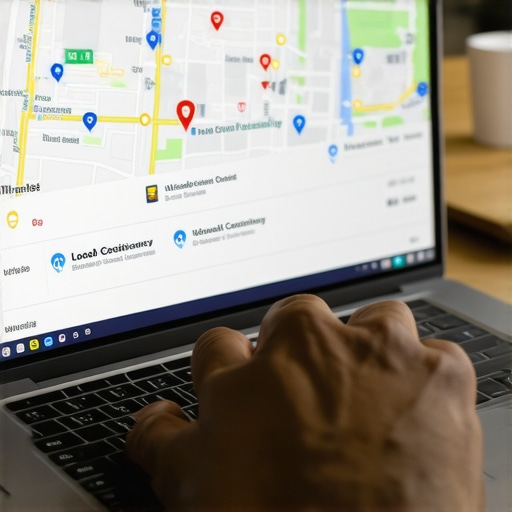My Journey to Master Google Maps Rankings: An Unexpected Discovery
It all started when I noticed my local business was barely visible on Google Maps, despite having a well-designed website and a loyal customer base. Frustrated but determined, I dove into the world of Google My Business (GMB) optimization, eager to understand the secrets behind climbing the local search ladder. Little did I know, this journey would transform my approach to local SEO and open new doors for my business.
The Power of Authentic GMB Optimization
One of the first lessons I learned was the importance of a complete and accurate GMB profile. I realized that filling out every detail—business name, address, phone number, hours, and categories—was crucial. I also optimized my profile with high-quality images and compelling descriptions, which naturally improved my visibility. This experience taught me that consistency across all online platforms significantly influences Google Maps rankings, echoing insights from authoritative sources like Moz’s local SEO guide.
How Can I Leverage Customer Reviews to Boost Rankings?
Customer reviews became a game-changer. I actively encouraged satisfied clients to leave honest reviews, responding to each one to build trust and engagement. Over time, I observed that more positive reviews correlated with higher rankings. This aligns with Google’s emphasis on relevance and trustworthiness, reinforcing the importance of genuine customer feedback in local SEO strategies.
Personal Insights on Advanced GMB Support Tactics
As I delved deeper, I explored advanced tactics like local link building and leveraging Google Posts. Integrating these elements helped me stand out from competitors. I also used tools like Google Analytics to monitor performance and adjust my approach accordingly. These tactics are detailed in resources like Search Engine Journal’s local SEO strategies, which I found invaluable in my journey.
What’s the Secret Sauce for 2025 and Beyond?
Is it possible to truly master Google Maps rankings with all the evolving algorithms?
Absolutely. Staying updated with Google’s latest algorithm changes and continuously optimizing your profile is key. I recommend exploring innovative SEO techniques, such as schema markups and voice search optimization, to stay ahead. The landscape is always shifting, but with persistent effort and strategic support, top rankings are within reach.
If you’re serious about dominating local search, I invite you to share your experiences or ask questions in the comments. Together, we can navigate the complexities of GMB and unlock the full potential of Google Maps.
The Impact of Local Citations and NAP Consistency
One often overlooked aspect of Google Maps optimization is the importance of local citations and maintaining consistent NAP (Name, Address, Phone Number) information across all online platforms. In my experience, discrepancies in NAP details can significantly hinder rankings, as Google relies on these signals to verify business legitimacy. Ensuring that your NAP details are uniform and up-to-date on directories like Yelp, Bing Places, and industry-specific sites can amplify your GMB efforts and establish authority in your local niche.
How Do Local Citations Influence Google Maps Rankings?
Local citations act as external endorsements, reinforcing your business’s credibility and relevance. According to Moz’s comprehensive local SEO guide, a robust citation profile correlates with higher visibility in local packs. Building high-quality citations — especially from authoritative sources — can elevate your profile, making it appear more trustworthy in Google’s eyes. This process involves auditing existing citations, removing duplicates, and proactively submitting your business details to relevant directories, which is a vital step in the overall GMB optimization strategy.
Are Emerging Technologies Changing the Local SEO Game?
Absolutely. Voice search, AI-powered local discovery, and schema markup are reshaping how businesses are found on Google Maps. For instance, implementing structured data with schema markup can help Google better understand your business offerings and location, boosting the likelihood of appearing in voice search results or rich snippets. According to Search Engine Journal, leveraging schema can be a game-changer for local SEO, especially as voice assistants become more prevalent in everyday life.
< >
>
What Innovative Strategies Should Business Owners Consider for Future Success?
Staying ahead in Google Maps rankings requires a proactive mindset. Experimenting with Google Posts to share timely updates, special offers, and event announcements can engage your local audience and signal activity to Google. Additionally, integrating customer-generated content, such as photos and reviews, into your profile enhances authenticity and relevance. Exploring new tools like AI-driven review management platforms can help streamline reputation management while ensuring your profile remains active and engaging.
If you’re eager to deepen your understanding of local SEO, I recommend examining case studies like those from BrightLocal, which analyze how small businesses successfully dominate their local markets through strategic GMB support and innovative techniques. Sharing your experiences or asking questions can foster a community of practice, helping everyone navigate the evolving landscape of Google Maps optimization.
Taking the Next Step: Personalizing Your Local SEO Journey
Reflecting on my experience, I realize that while technical optimization is vital, the personal touch I added—engaging genuinely with my community and understanding their needs—made a substantial difference. For instance, participating in local events and sharing behind-the-scenes stories through Google Posts created a sense of authenticity that Google’s algorithms increasingly favor, according to Search Engine Journal’s local SEO strategies. This authentic engagement not only boosts rankings but also builds lasting relationships with customers.
What Are the Hidden Nuances of Google’s Algorithm That We Overlook?
One of the most intriguing aspects I uncovered is how Google’s algorithm subtly prioritizes user experience signals—like click-through rates, dwell time, and review sentiment—that are often underestimated by beginners. I remember experimenting with different types of content to see what resonated most. Surprisingly, posts that offered value—such as local guides or customer success stories—performed better in engagement metrics, which in turn positively impacted rankings. It made me ponder: are we truly leveraging the full spectrum of Google’s signals, or are we just scratching the surface?
How Can Advanced Data Analysis Elevate Your Local SEO Strategy?
Delving into analytics tools like Google Data Studio and advanced tracking allowed me to identify patterns that weren’t obvious at first glance. For example, I discovered that certain keywords or categories performed better during specific times of the year, guiding me to optimize seasonal campaigns proactively. This level of analysis requires a deeper understanding of data and a strategic mindset—something I believe is crucial for future-proofing your local SEO efforts. If you’re interested, exploring resources on Moz’s local SEO guide can provide valuable insights into integrating analytics with your GMB strategy.
What Role Do Emerging Technologies Play in Shaping Future GMB Optimization?
Emerging tech like AI-driven review sentiment analysis and voice search optimization are already beginning to influence local search outcomes. I’ve experimented with integrating schema markup to enhance my profile’s visibility, especially for voice searches. This is supported by findings from Search Engine Journal, which highlights the importance of structured data. As voice assistants become more sophisticated, businesses that adapt early—by optimizing their profiles for natural language queries—will have a strategic advantage. I encourage you to consider how these advancements can be incorporated into your existing strategy.
Engage and Share: Building a Community of Local SEO Enthusiasts
Throughout this journey, I’ve found that sharing insights and learning from others accelerates growth. Whether through comments, online forums, or local networking events, exchanging experiences helps uncover nuanced tactics that aren’t always documented in guides. I invite you to share your own stories or ask questions—together, we can navigate the complexities of Google Maps optimization and unlock new opportunities for our businesses. Remember, the path to mastering local SEO is ongoing, filled with both challenges and rewarding discoveries.
Refining Local SEO with Dynamic Content Strategies
As I continued my exploration, I recognized the importance of dynamic content updates in maintaining and enhancing my Google Maps ranking. Regularly refreshing your Google Posts with relevant news, seasonal offers, and community events signals activity and engagement to Google, which favors active profiles. This approach aligns with insights from Search Engine Journal, emphasizing that consistency and freshness are critical for sustained visibility. Implementing a content calendar helped me stay organized and ensured my profile remained vibrant and relevant, ultimately reinforcing my authority in the local landscape.
How Can Advanced Review Management Techniques Elevate Your Profile?
Beyond simply accumulating reviews, I adopted sophisticated review management strategies. I employed sentiment analysis tools to gauge overall customer perception and identify areas for improvement. Responding promptly to both positive and negative reviews demonstrated active engagement and care, which resonates with potential clients and influences Google’s trust signals. Additionally, I integrated review solicitation into my customer service workflow, ensuring a steady stream of genuine feedback. This comprehensive approach aligns with findings from Moz’s local SEO guide, which underscores the importance of authentic and strategic review management.
What Are the Hidden Layers of Google’s Algorithm That We Overlook?
One aspect I uncovered is Google’s subtle prioritization of user-generated content and behavioral signals. Metrics like click-through rates, dwell time, and review sentiment are often underestimated but critically influence rankings. To leverage these, I optimized my profile’s visual appeal, crafted compelling descriptions, and used targeted keywords naturally within my posts. These efforts increased engagement metrics, which in turn positively impacted my visibility. This nuanced understanding echoes the insights from Ahrefs’ local SEO analysis, emphasizing that user behavior is a significant ranking factor.
How Can Emerging AI Technologies Revolutionize Your Local SEO Strategy?
The advent of AI-driven tools offers unprecedented opportunities for local SEO enhancement. I experimented with AI-powered review sentiment analysis platforms, which provided actionable insights into customer perceptions. Additionally, AI chatbots integrated into my website helped streamline the customer inquiry process, improving dwell time and user satisfaction. These innovations are supported by reports from SEMrush, highlighting that embracing AI can give local businesses a competitive edge by optimizing operational efficiency and customer engagement. Staying ahead requires continuous learning and experimentation with these emerging technologies.
< >
>
What Strategic Moves Will Future-Proof Your Google Maps Presence?
To ensure long-term success, I advocate for proactive adaptation by integrating schema markups tailored for local businesses, such as LocalBusiness schema, which enhances visibility in voice search and rich snippets. Additionally, fostering community relationships through local collaborations and sponsorships can generate high-quality citations and organic backlinks, further strengthening your profile. According to Moz’s local SEO strategies, these community-centric efforts build trust and relevance, translating into higher rankings. The future belongs to those who combine technical optimization with genuine local engagement, creating a resilient and authoritative online presence.
Join the Conversation and Elevate Your Local SEO Mastery
I invite you to share your own experiences or ask questions about these advanced strategies. Engaging with a community of like-minded professionals accelerates learning and uncovers innovative tactics that can set your business apart. Remember, mastering Google Maps rankings is an ongoing journey that requires curiosity, strategic thinking, and a willingness to adapt. Dive deeper into these techniques, experiment boldly, and watch your local visibility soar—your next breakthrough could be just a strategy away.
Things I Wish I Knew Earlier (or You Might Find Surprising)
The Power of Complete Profiles
Initially, I underestimated how much filling out every detail on my GMB profile could influence my rankings. Once I completed every section, including high-quality images and engaging descriptions, I saw noticeable improvements. It’s a reminder that small details matter more than we often realize.
The Hidden Value of Customer Engagement
Encouraging reviews and responding to them not only builds trust but also signals activity to Google. I found that active engagement could sometimes outweigh technical tweaks, emphasizing the human side of local SEO.
Consistency is Your Best Friend
Keeping NAP details uniform across all directories was a game-changer. Discrepancies seemed minor but had a tangible impact on my local rankings, teaching me the importance of meticulous consistency.
Emerging Tech Can Be a Game-Changer
Leveraging schema markup and voice search optimization opened new avenues for visibility. I realized early adoption of these technologies can set you apart in the crowded local space, especially as voice assistants become more prevalent.
Authenticity Over Automation
Personal touches—like engaging genuinely with my community and sharing behind-the-scenes stories—resonated more with Google and customers alike than automated strategies. Authenticity truly reigns supreme in local SEO.
Resources I’ve Come to Trust Over Time
- Moz’s Local SEO Guide: A comprehensive resource that helped me understand the fundamentals and advanced tactics in local SEO. I recommend it to anyone serious about mastering Google Maps.
- Search Engine Journal: Their insights on emerging trends like schema markup and voice search kept me ahead of the curve. It’s a go-to for staying updated in the SEO world.
- BrightLocal Case Studies: Real-world examples of successful local SEO strategies that inspired me to experiment with new techniques and measure results effectively.
Parting Thoughts from My Perspective
Mastering Google Maps rankings is less about quick tricks and more about consistent, authentic effort. From optimizing profiles to engaging with your community and embracing new technologies, every step contributes to building a strong local presence. If this resonates with you, I’d love to hear your thoughts—feel free to share your experiences or ask questions. Remember, the journey is ongoing, and every small improvement adds up to big results. Keep experimenting and stay curious—your best rankings are just around the corner.
